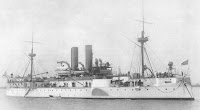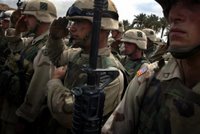Each option stated their main points vigorously and defended them well. When the votes came in, 2nd hour had a tie between option 2 and 3; 3rd hour had a tie between option 1 and 2. Interestingly enough, option 4, the pull-out of Vietnam now choice, only received a couple of votes in each class (but not for lack of trying). I don't know if this is b/c of the current wars in Iraq and Afghanistan and the backlash vs. an Iraq pullout. But well done to all involved.
In the film, Fog of War, that we've been watching recently, former Secretary of Defense, Robert McNamara asked the following question when reflecting thing when analyzing America's use of chemical weapons like Agent Orange on Vietnam to defoliate the jungles and make it "easier" for our soldiers to fight and win against the Viet Cong.
"How much evil must we do in order to do good?"
Secretary of Defense Robert McNamara
A couple things to consider when answering this question: if we're doing evil in order to do good, is that good really a good thing? If it is a good thing, then at what point do the evil means (that you are using, for instance, Agent Orange) become so heinous that it negates the good that you are doing?
This is an optional question to answer if you feel like tackling it for 4 extra credit points.
On a different angle, Connecticut Attorney General Richard Blumenthal has been exposed has having misrepresented his time during the Vietnam Era as he runs for the U.S. Senate spot in this upcoming election. http://www.nytimes.com/2010/05/18/nyregion/18blumenthal.html?src=me&ref=general It seems that some members of the Baby Boom generation, especially those who serve in the military can't really come to terms with what they did during this time period, Mr. Blumenthal included.


 Given what we've read and seen about the Spanish American War, how does this war fit with the criteria that we'd discussed? Consider the following:
Given what we've read and seen about the Spanish American War, how does this war fit with the criteria that we'd discussed? Consider the following:










